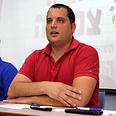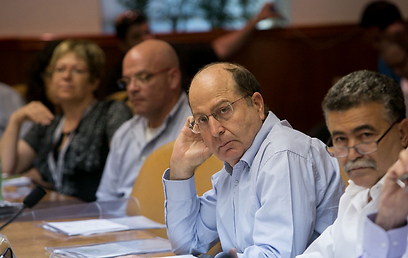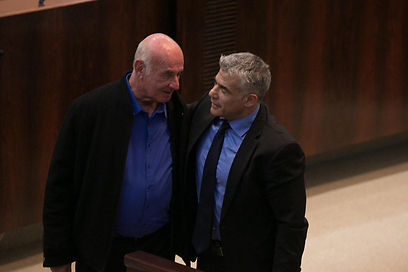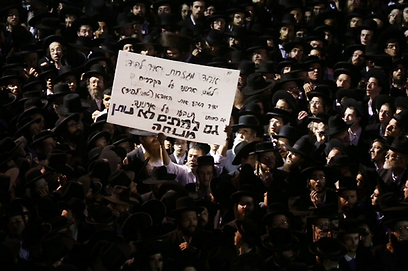
Peri Committee deadlocked
Ministers of Peri committee convened for last push on bill intent on putting haredi enlistment into law with ministers clashing over yeshiva heads' criminal accountability, whether Arabs are included, how long yeshiva students currently supposed to enlist will serve
The Peri Committee, convened Sunday to vote on the different articles of the proposed outline for haredi enlistment, deadlocked over a disagreement between committee chairman, Science and Technology Minister Yaakov Peri and Defense Minister Moshe Ya'alon, regarding the protocol for granting exemption from IDF service. Deliberations are expected to continue Monday.
In a surprise move, Ya'alon demanded that the committee withdraw its proposal to obligate haredim to enlist after a three-year period and demanded that the issue be left to the defense minister's discretion.
Related stories:
- New bill: Haredi recruitment at age 21; 1,800 exemptions
- Haredi recruits swear allegiance to IDF
- Yisrael Beiteinu demands Arabs be included in draft bill
Members of the Yesh Atid party were outraged, saying Ya'alon's proposal effectively voids the universal enlistment principle. Peri and Ya'alon are set to meet Monday.
Disagreements among committee members surfaced at the beginning of the committee's deliberation. Ministers Limor Livnat (Likud), Amir Peretz (Hatnua) and Uri Ariel (Habayit Hayehudi) announced that they opposed one of the proposed legislation's central articles. The section that they opposed ruled that heads of yeshivot can face criminal charges if their students dodge the draft.
Nonetheless, as was expected, the committee unanimously authorized one of the law's articles which stipulated that for each year, 1,800 exemptions from IDF service will be given to yeshiva students diligent and persistent in their Torah studies. The group was dubbed by the committee as "Torah prodigies."

The committee (Photo: Ohad Zwigenberg)
The committee's outline, revealed last week by Ynet, requires the establishment of an enforcement and supervision mechanism in order to reach the high enlistment quotas stipulated by the committee.
For locating yeshiva dodgers, the IDF will be assisted by yeshiva heads who will be asked to transfer a financial guarantee in order to prevent false affidavits regarding the number of students actually studying.
The bill thus bears personal liability on the yeshiva heads. Service deferment will be subject to yeshiva students and heads filing statements that the student is in fact studying, and committing to reporting any condition changes during that period of time. Filing a false affidavit would be considered a criminal offense. However, draft dodgers will be shielded from economic sanctions that their yeshiva heads might face if caught lying.

Peri with Yair Lapid (Photo: Ohad Zwigenberg)
During the committee's deliberation, Deputy Education Minister Avi Weitzman, who is not a committee member, entered the discussion and slammed the committee's chairman Yaakov Peri, regarding this article.
Students support
Earlier Sunday, before the committee convened, Uri Reshtik, the chairman of the National Student Union called Peri to inform him that after learning the subject and the proposed legislation, the union had decided to publically express their support of the committee.According to Reshtik, the union sees the Peri Committee outline as a "historic opportunity to create uniformity in Israeli society." He further added that the union believed that achieving an "equal share of burden" is a "national mission in which the (union) wishes to take part." He called on committee members to vote for the legislation.

Protesting haredi recruitment in Jerusalem (Photo: Ohad Zwigenberg)
Criticism was quick to follow. The Student Union in the haredi campus in Kiryat Ono – which represents some 2,500 haredi students unionized as part of the National Student Union – disavowed the national organization's support.
In a statement, the haredi union said: "This legislation is undertaken without dialogue and through coercion. This is one of the most sensitive issues currently debated in the public discourse. It is only appropriate that a consultation with representatives of the haredi public take place."
During an IDF preparatory course graduation ceremony held in Jerusalem's International Convention Center, Moshe Ya'alon, the Likud's representative to the committee, expressed his support for the committee's outline.
"We are currently working on the right outline required for integrating haredim and Arabs. We are working with an issue which is supposed to deal with a reality which has developed here for the last 65 years of the State's existence and is still an open wound on the heart of Israeli society. The smart thing for us to do is to work out a way in which more haredim are integrated into the army and workforce."
"The best way to achieve this is not through hatred and de-legitimization. The change is in the process, not in sword brandishing. Without threats of jail time for those studying Torah, without threats and without sanctions…this is the outline which was formulated and which I hope will pass tonight. It's true that the outline does not promise complete equality, but this is the right and only way to bring (Arabs and haredim) to take responsibly."
The Peri Committee convened Sunday evening at the Prime Minister's Office to authorize the law's different articles. Looming was Housing Minister Uri Ariel's (Habayit Hayehudi) objection to the bill's bid to extend the hesder yeshiva service to two years, claiming "it is contrary to the coalition agreement. Habayit Hayehudi party will object and demand to remove this item from the bill."
Yisrael Beiteinu also expressed its objection to the bill, saying that the outline fails to address the issue of minorities, namely Arabs, and their enlistment to either the IDF or civil service.
Minister Limor Livnat brought up an additional issue, pointing to the problem that women in the army might face with the haredi enlistment, stressing that the enlistment quotas might hurt the current fabric of the IDF.
"It is important to keep up the ongoing integration of women in the army and preserve the impressive achievements they have registered over the years. There is a bipartisan fear by female MKs that (haredi enlistment) will harm the status of women in the IDF and it is our duty to remove this fear now, during the law's formulation."
Justice Minister Tzipi Livni also commented on the outline, saying Sunday that "it is unfair to call everyone to lend a hand and then run away. Equal share of the burden is a daunting and complicated task, but it is mostly a moral, educational and social one.
"During the committee's deliberations, the gap between the principle of an equal share of the burden and its implication was revealed: While hesder yeshiva students serve just 16 months, the new haredi conscripts will serve longer."
"This is not an equal share of the burden. We at the Hatnua will fight to make sure that the term 'equal share of the burden' will effectively be a reality for everyone. And yes, that must also include Israel's Arab citizens, not in army service, not yet, but certainly in civil service."
- Receive Ynetnews updates directly to your desktop










